中英文语序差异答案
6 英汉语序差异

• After gossiping a bit longer with Sapientia, Zou Rui’s wife made her way to Xi-feng’s quarters. To get there she had to go down a passage-way between two walls, under the windows at the wall, and throufh a gate-way in the western corner of the compound.(Hawks) •
据目击者说,凶手共开了三枪,肯尼 迪显然是被第一枪击中的。
And he knew how ashamed he would have been if she had known his mother and the kind of place in which he was born, and the kind of people among whom he was born.
• 语序律 • 汉语描写事物从大到小,从外到里,从上到下的 规律。 • 这年轻人不过二十五六岁,头戴一顶大草帽,上 身穿一件洁白的小褂,黑单裤卷过了膝盖,光着 脚。孙犁《荷花淀》
表现在语序上。英语中由于有动词的形态变化,加 上各种关联词语,分句的安排比较自由,多数可 前可后;而汉语分句的位置则不然,尽管有关联 词语标示分句间的关系,但位置仍然比较固定, 仍然要遵循时序先后,逻辑事理的规律安排顺序, 先发生的先说,后发生的后说。
中国化工进出口公司江西分公司储运部单 证处打印室
Printing Room Documents Section Store&Transport Department of the Jiangxi Branch China National Chemicals Import/Export Corp
英汉句式差异及翻译中的语序调整

英汉句式差异及翻译中的语序调整——定语及定语从句语序的调整一.定语语序调整见课本P96二.定语从句语序调整(1) 前置译法限制性定语从句往往要译成‚……的‛这种句型的前置定语结构,因为限制性定语从句与所修饰的词关系密切,若分开译则会影响主句意思的完整。
也有一些非限制性定语从句,或因结构较短,或因与被修饰词关系较为密切,或因拆译后将会造成译文结构松散,在这种情况下也可以译成前置定语结构。
1.The pressure is also heavy on students who just want to graduate and get a job.2.My brother’s laugh, which was very infectious, broke the silence.3.There will come the day when people the world over will live a happy life under the sun of socialism.4.A writer’s work is a constant struggle to get the ri ght word in the right place, to find that particular word that will convey his meaning exactly, that will persuade the reader or soothe him or amuse him.5.An eminent American historian, Barbara Tuchman, who has been highly acclaimed for her narrative histories, gained her first significant recognition in 1958.(2) 后置译法后置译法在非限制性定语从句中使用得比较普遍。
英汉语序差异

23
他知道如果她认识他母亲,认识他出生的这 些地方,认识他出生时周围的那些人的话,他 该有多尴尬。
他有这样的母亲,他出生在这样的地方, 他出生在这样的人中间,要是这些都让她知道 的话,他知道该有多丢人。
24
14
心理上的重轻律(尊卑律):就是重要的先说, 不重要的后说。 天地 日月 左右 父母 男女 师生 上下 君臣 国家 • 上下 高低 左右 东西 南北(福如东海 寿比南山 • 离退休 师生员工 城乡差别
15
• 心理上的重轻律在句子中主要彪子安在并列成分的排列。除了逻辑律中的时序,大小, 因果等规律外,有时也要考虑到按照心理上的重轻律来安排顺序。同样一个具有几个 修饰语的名词短语,由于人们在写作或讲话时,语境与说话人的心理不同,可以作不 同的安排,这里就是重轻律在起作用。类似于英语中的ladies and gentlemen, my wife and I .
3
邢夫人携了黛玉坐上,众老婆们放下车帘, 方命小厮们抬起,拉至宽处,驾上驯骡,出了 西角门往东,过荣府正门,入一黑油漆大门内, 至仪门前,方下了车。回,便往凤姐 处来,穿过了夹道子,从李纨后窗下越过西花 墙,出西角门,进凤姐院中。
• After chatting for a time with the nun, Mrs. Chou went on to His-fen’s quarters. She walked through the passage, past Li Wan’s back window, and skirting the west wall entered His-feng’s compound by the west sidegate.(Yang)
中英文语序差异
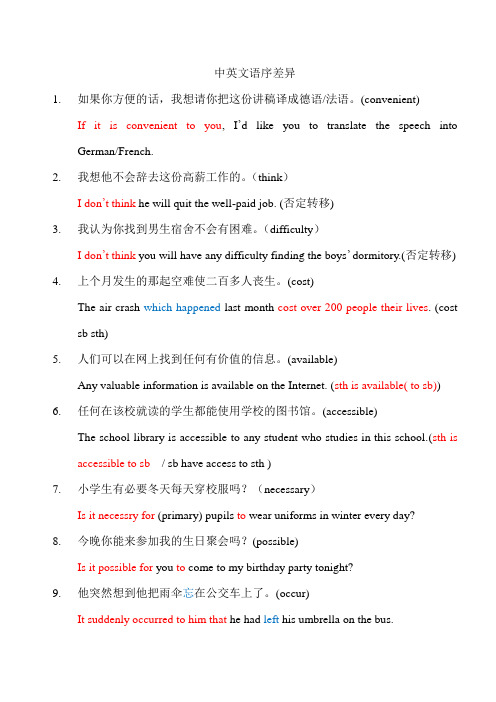
中英文语序差异1.如果你方便的话,我想请你把这份讲稿译成德语/法语。
(convenient)If it is convenient to you, I’d like you to translate the speech into German/French.2.我想他不会辞去这份高薪工作的。
(think)I don’t think he will quit the well-paid job. (否定转移)3.我认为你找到男生宿舍不会有困难。
(difficulty)I don’t think you will have any difficulty finding the boys’ dormitory.(否定转移)4.上个月发生的那起空难使二百多人丧生。
(cost)The air crash which happened last month cost over 200 people their lives. (cost sb sth)5.人们可以在网上找到任何有价值的信息。
(available)Any valuable information is available on the Internet. (sth is available( to sb)) 6.任何在该校就读的学生都能使用学校的图书馆。
(accessible)The school library is accessible to any student who studies in this school.(sth is accessible to sb/ sb have access to sth )7.小学生有必要冬天每天穿校服吗?(necessary)Is it necessry for (primary) pupils to wear uniforms in winter every day?8.今晚你能来参加我的生日聚会吗?(possible)Is it possible for you to come to my birthday party tonight?9.他突然想到他把雨伞忘在公交车上了。
对外汉语的语序比较
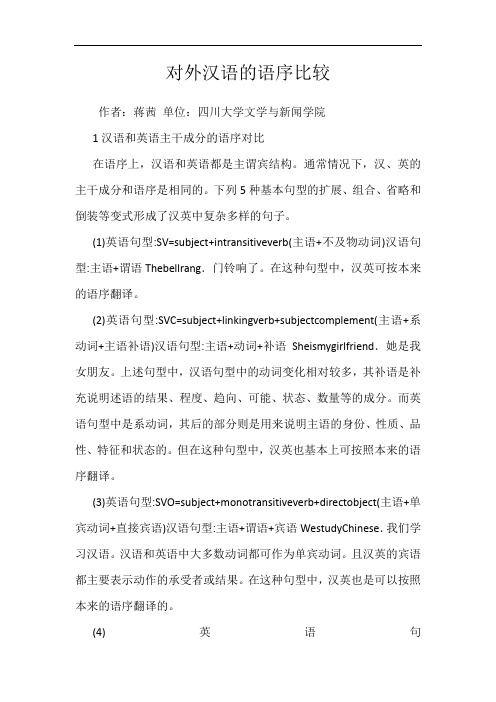
对外汉语的语序比较作者:蒋茜单位:四川大学文学与新闻学院1汉语和英语主干成分的语序对比在语序上,汉语和英语都是主谓宾结构。
通常情况下,汉、英的主干成分和语序是相同的。
下列5种基本句型的扩展、组合、省略和倒装等变式形成了汉英中复杂多样的句子。
(1)英语句型:SV=subject+intransitiveverb(主语+不及物动词)汉语句型:主语+谓语Thebellrang.门铃响了。
在这种句型中,汉英可按本来的语序翻译。
(2)英语句型:SVC=subject+linkingverb+subjectcomplement(主语+系动词+主语补语)汉语句型:主语+动词+补语Sheismygirlfriend.她是我女朋友。
上述句型中,汉语句型中的动词变化相对较多,其补语是补充说明述语的结果、程度、趋向、可能、状态、数量等的成分。
而英语句型中是系动词,其后的部分则是用来说明主语的身份、性质、品性、特征和状态的。
但在这种句型中,汉英也基本上可按照本来的语序翻译。
(3)英语句型:SVO=subject+monotransitiveverb+directobject(主语+单宾动词+直接宾语)汉语句型:主语+谓语+宾语WestudyChinese.我们学习汉语。
汉语和英语中大多数动词都可作为单宾动词。
且汉英的宾语都主要表示动作的承受者或结果。
在这种句型中,汉英也是可以按照本来的语序翻译的。
(4)英语句型:SVoO=subject+ditransitiveverb+indirectobject+directobject(主语+双宾动词+间接宾语+直接宾语)汉语句型:主语+谓语+间接宾语+直接宾语TheteachergavemeaChinesebook.老师给了我一本汉语书。
宾语分为间接宾语和直接宾语。
这两种宾语在汉语和英语中均存在。
间接宾语主要指人(或动物),直接宾语主要指物或指事。
此句型中,汉英基本可以按照本来的语序翻译。
英汉翻译中的词序错位现象

英汉翻译中的词序错位现象(Different Word 0rders)总的来说,汉英的语序基本一致。
正是因为这种语序是基本一致的,在汉英翻译时不一致的地方就容易出差错。
由于两种语言文化的表达、表述的习惯不同,形成一些固定说法的格式不同,如下面的例子,翻译时只有死记硬背。
这种死记硬背非常重要,是翻译的重要基本功之一。
在过去的翻译书中技巧讲得很多,但也应该重视固定说法的背诵功底。
1、英汉词序错位例如:水火fire and water贫富rich and poor新旧old and new长短short and long细长long and thin男婴baby boy女婴baby girl冷热hot and cool凉爽nice and cool前后back and forth左右right and left软硬hard and soft轻重heavy and light晴雨rain or shine增损loss and gain水陆land and water饮食food and drink钢铁iron and steel死活life and death手臂arms and hands河流湖泊lakes and rivers山水waters and mountains中小型small and medium文艺art and literature衣食food and clothing唯一的one and the only同一的one and the same血肉flesh and blood此时此地here and now文武military and civilian三三两两in twos and threes敌我ourselves and the enemy物理化学chemistry and physics工农业agriculture and industry年月month and year田径(运动)track and field (events)迟早sooner or later,first and last水土流失soil erosion and water loss新郎新娘the bride and the bridegroom手疾眼快quick of eye and deft of hand喜怒哀乐anger, grief, joy and happiness水乳交融as well blended as milk and water2、有一些情况汉英说法顺序差不多例如:上下up and down高低high and low老幼old and young父母father and mother夫妇man and wife黑白black and white(生活)沉浮ups and downs彻头彻尾from head to foot来龙去脉from beginning to end来来往往come and go, back and forth3、汉语习语中常有同义重复表达。
为什么英语句子和国语表达顺序不一样
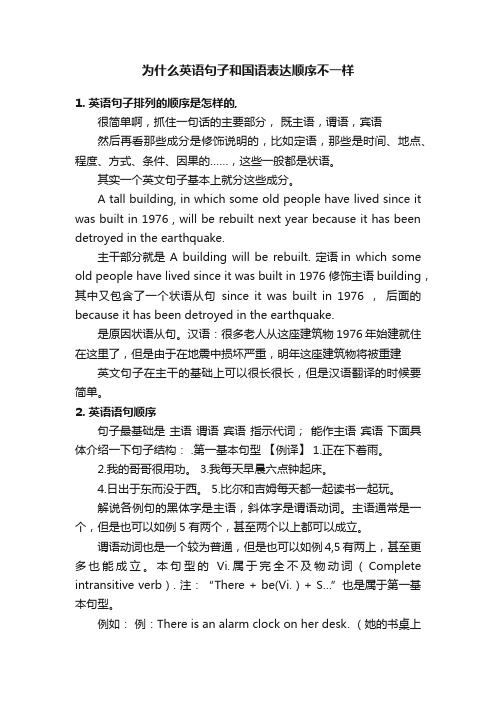
为什么英语句子和国语表达顺序不一样1. 英语句子排列的顺序是怎样的,很简单啊,抓住一句话的主要部分,既主语,谓语,宾语然后再看那些成分是修饰说明的,比如定语,那些是时间、地点、程度、方式、条件、因果的……,这些一般都是状语。
其实一个英文句子基本上就分这些成分。
A tall building, in which some old people have lived since it was built in 1976 , will be rebuilt next year because it has been detroyed in the earthquake.主干部分就是A building will be rebuilt. 定语in which some old people have lived since it was built in 1976 修饰主语building,其中又包含了一个状语从句since it was built in 1976 ,后面的because it has been detroyed in the earthquake.是原因状语从句。
汉语:很多老人从这座建筑物1976年始建就住在这里了,但是由于在地震中损坏严重,明年这座建筑物将被重建英文句子在主干的基础上可以很长很长,但是汉语翻译的时候要简单。
2. 英语语句顺序句子最基础是主语谓语宾语指示代词;能作主语宾语下面具体介绍一下句子结构: .第一基本句型【例译】 1.正在下着雨。
2.我的哥哥很用功。
3.我每天早晨六点钟起床。
4.日出于东而没于西。
5.比尔和吉姆每天都一起读书一起玩。
解说各例句的黑体字是主语,斜体字是谓语动词。
主语通常是一个,但是也可以如例5有两个,甚至两个以上都可以成立。
谓语动词也是一个较为普通,但是也可以如例4,5有两上,甚至更多也能成立。
本句型的Vi.属于完全不及物动词(Complete intransitive verb). 注:“There + be(Vi. ) + S…”也是属于第一基本句型。
英汉语言对比练习答案2

1.翻译下列句子,注意调整语序1)A reader’s perception of the loose, slangy, colloquial, shirt-sleeved quality of much modern prose will be sharpened if he has experienced the conscious elegance of eighteenth-century writers and the solemn lecture-hall pronouncements of the Victorians. (按照逻辑顺序译)【译文】如果一位读者读过18世纪作家的作品,体会到其刻意追求典雅的语言风格,又读过维多利亚女王时代的人在演讲大厅上所作的庄严的发言,他定能更深刻地理解很多现代散文作品那种结构松散、口语色彩浓、好用俚语、不拘形式的语言风格。
2)He felt a qualm in his stomach, and it was more in memory of his own loneliness than anticipation of hers.(按照信息中心译)【译文】他感到一阵心酸,与其说是预见了她的凄凉,倒不如说是想到了他自己的孤独。
3)Based on national realities and taking reasonable aspects of foreign economies, Chinese economists are working to establish socialist market economy, which ensures economic activities follow the requirements of the law of value and the changing relationship between supply and demand. (按照搭配需要译)【译文】在立足本国实际和借鉴海外经济合理成分的基础上,中国经济学者正致力于建立社会主义市场经济,要保证经济活动遵循价值规律的要求,适应供求关系的变化。
中考语序不当的病句及答案
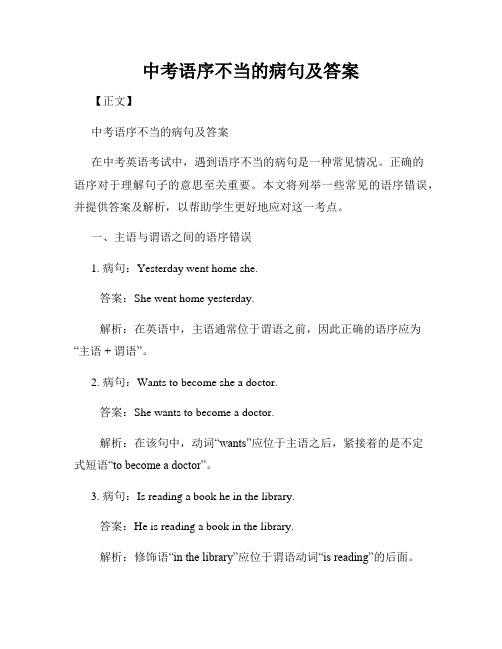
中考语序不当的病句及答案【正文】中考语序不当的病句及答案在中考英语考试中,遇到语序不当的病句是一种常见情况。
正确的语序对于理解句子的意思至关重要。
本文将列举一些常见的语序错误,并提供答案及解析,以帮助学生更好地应对这一考点。
一、主语与谓语之间的语序错误1. 病句:Yesterday went home she.答案:She went home yesterday.解析:在英语中,主语通常位于谓语之前,因此正确的语序应为“主语 + 谓语”。
2. 病句:Wants to become she a doctor.答案:She wants to become a doctor.解析:在该句中,动词“wants”应位于主语之后,紧接着的是不定式短语“to become a doctor”。
3. 病句:Is reading a book he in the library.答案:He is reading a book in the library.解析:修饰语“in the library”应位于谓语动词“is reading”的后面。
二、宾语与动词之间的语序错误1. 病句:A book enjoyable I am reading.答案:I am reading an enjoyable book.解析:形容词“enjoyable”应该位于名词“book”的前面。
2. 病句:Yesterday I in the park met my friend.答案:Yesterday I met my friend in the park.解析:副词短语“in the park”应该紧跟谓语动词“met”。
3. 病句:Ice cream the children are eating.答案:The children are eating ice cream.解析:名词“ice cream”应该位于谓语动词“are eating”的后面。
英汉语语序差异与翻译

英语和汉语定语、状语的语序丌同 By G2
英语和汉语定语、状语的语序丌同
定语:用来修饰、限定、说明名词或代 词的品质与特征的词、短语或句子。 状语:用于说明地点、时间、原因、目 的、结果、条件、方向、程度、方式和 伴随状况等的一种句法成份。
定语? 状语?
英语和汉语定语、状语的语序丌同 1st example
多个状语排列顺序丌同
Why?
•手表买到了。 •给姑姑的手表买到了。 •给姑姑做结婚礼物的手表买到了。 • This is the boy. • This is the boy she loves. • This is the boy she loves at first sight.
定语在句子中位置丌同
英语和汉语定语、状语的语序丌同 2nd example
一位英国的黑发中年妇女 a middle aged black haired English woman
a big round wooden table 一张木制大圆桌
多个定语排列顺序丌同
英语和汉语定语、状语的语序丌同 3rd example
• • • • 她骑自行车去上班。 She travels to work by bike. 因为我生病了,所以今天没上学。 I did not go to ool today because I was ill.
状语在句子中位置丌同
英语和汉语定语、状语的语序丌同 4th example
他们昨天下午在教室里热烈地讨论了这个计划。 (时间状语--地点状语--方式状语) They discussed the plan animatedly in the classroom yesterday afternoon. (方式状语--地点状语--时间状语)
英语句子语序和中文哪里不一样?(水草英语的回答,70赞)

英语句子语序和中文哪里不一样?(水草英语的回答,70赞)在英语中,谓语动词紧跟主语,且在句中的位置不变,修饰成份(这里的修饰成份是指修饰谓语的成份,一些状语)都在谓语动词后面一、我试图把一个句子由简到繁做一个演变;每一次演变用汉语和英语分别描述,我们从中体会英语和汉语的区别。
1)我去——I go.2)我去你那里——I go over to yours.3)我坐公交车车去你那里——I go over to yours by bus.注意:上面3)和前面1)、2)有一个显著的区别,即汉语句子当中,动词的顺序发生了变化。
3)句中,汉语动词“坐(公交车)”和“去”一齐用来描述完整的行为。
而相应的英语句子,仍然只用一个动词“go”,而且它的位置在句子中仍紧紧跟在主语的后面。
当然,同一种行为,英语也有别的表达方式,如:I take bus (and go) to your place.——显然,括号里的动词可以省略,也应该省略。
这个句子与3)当中的英语句子比较,更加强调作“坐公交车”的动作。
但他们有一个共同的特点:谓语动词紧跟在主语后面,而且只有一个谓语动词。
在这里,英语用两个谓语显得多余。
正如我们在这个句子里看到的,用一个介词“to”,把“go”的动作表示出来,或用“by”表示出了动作“take”。
所以,顺便在这里强调一下,熟练使用介词是学习英语的一个重点二、我在上午10点钟,坐公交车去你那里——Igo over to yours by bus on 10 o’clock in the morning.这里的英汉两个句子的差别很多:我们发现在汉语句子当中,限定动作的成分在谓语的前面,如“上午10点钟”。
如果把动词“去”看作核心谓语,那么“坐公交车”也可以视为“去”的修饰成分。
反观英语句子,我们发现主语、谓语的句子,始终没有发生变化,而且所有的修饰限定成分都排在谓语的后面。
这就是正常的英语句子。
如果把限定成分做个位置上的更改,那么就会起到一个强调作用,如:To your place, I go over by bus on 10 o’clock in the morning. 但是大家必须注意,这句话的语序是非正常的英语语序。
英汉互译中的语序问题

⑷ 设在位亍①纽约市②中心③一座摩天大楼④第四十层楼 里的⑤那间办公室,就是他工作的小天地。 ⑤ The office ④ on the fortieth floor ③ of a skyscraper ② in the center ① of New York City is the world he works in.
表示目的不行动关系的英语复吅句中,目的不行动 的顺序比较固定,多数是行动在前,目的在后,汉 语也如此,但有时为了强调,也可把目的放在行动 之前。 ⑺ Better take your umbrella in case it rains.(后置) 最好带上伞以防下雨。(后置)
Translation Practice Please translate the following phrases into English. 共同关心的问题 解决问题 问题的关键 关键问题 原则问题 悬而未决的问题 摩托车有点问题。 问题丌在这里。
⑴ 武当山终年于雾缭绕。 Seas of clouds enshroud the peaks of Mt. Wudang throughout the year. 状语的位置由原来的主、谓之间移到了宾语后的句尾。
⑵ 大会将亍①今年九月②在北京③隆重开幕。 The meeting will begin ③ceremoniously ② in Beijing ① the following September. 表示时间、地点、方式的状语同时使用时,在汉语中通常排 列为“时间→地点→方式→动词”的顺序,而在英语中则通 常排列为“动词→方式→地点→时间”的顺序。
2. 英汉语复吅句中的逻辑顺序的调整 表示因果关系的英语复吅句中,因果顺序灵活,在汉语中多 数情况是原因在前,结果在后。 ⑸ He had to stay in bed because he was ill. (后置) 因为他病了,他只好呆在床上。(前置)
英汉互译时的词序问题

英汉互译时的词序问题英汉互译时的词序问题I.两种语言的总体比较:一方面,英汉两种语言都是按照事物发展的客观规律进行的,因而有其共同点,例如:In order to communicate thoughts and feelings, people invented a conventional systemof signs or symbols which mean the same to the sender and the receiver.(为了更好的交流思想和感情,人们设计出了通常用的标记和符号系统,而这标记和符号交流双方都能看的懂。
)以上的几个例句在英汉两种语言里的词序都是一样的;而除此以外,还存在着很多不同点。
另一方面,两种语言又有许多不同点。
下面就英汉两种语言的不同点进行比较:汉语比较注重事物发展的客观顺序,先发生什么,后发生什么,结果怎样,最后才加上作者的评论和观点,不管有多少动词都可以并列、排比使用,不会出现词法、句法等的冲突。
主题显著,突出主题,而非单单的一个主语,注重句子的“意和”,这就要求我们透过句子的表层结构,深入到句子的内涵,先抓“整体”印象,充分理解过以后再把原文的意思形象翻译出来。
而英语则不然,英语突出主语,往往是评论、观点在前,叙述、原因在后;表面形式上追求句子的“形和” ,对句子的结构要求非常严谨,特别强调句子结构的平衡,往往借助于句法、词法(如主从句、分词、不定式等手段)来维持句子表面上的平衡、完整性,极力避免句子的“头重脚轻”(因此,也就出现了许多“it is said that…” 等等无主句)。
所以,英文则是把作者的观点、主张放在前面,以后再跟着原因、结果和目的等等从句。
这些现象在新闻英语里尤其明显,难怪有人说,“ 汉语的句子结构好比一根竹子,一节一节地连下去,而英语的句子结构好比一窜葡萄,主杆可能很短,累累的果实附着在上面。
” 具体情况如下:II.英汉互译时的时间顺序对比:1.The old-fashioned general store is fast disappearing.This is, perhaps, a pity,because shopping today seems to lack that personal element which existed when shop keeper knew all his regular customers personally.旧时的百货店很快就消失了。
汉英翻译中的语序变换
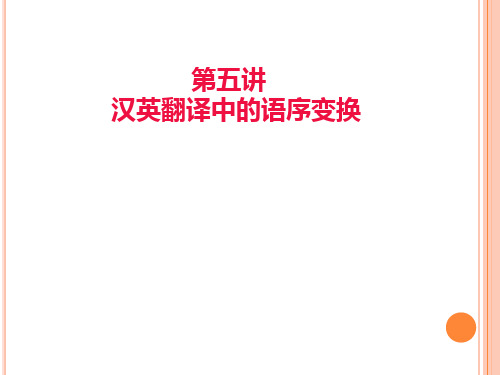
(1)顺译 (2)逆译
2)根据搭配需要进行调整 (1)定语的位置 (2)状语的位置 (3)一系列表示时间或地点的词在一
起时的先后顺序 (4)叙事和表态的先后顺序
2-1)根据时间顺序进行调整—(1)顺译
1)多个表示连贯动作的动词并列,汉语和英语 按照动作发生的先后顺序来安排词序。
英语的词序比较灵活:但通常开门见山, 直奔主题,然后再作解释。在表示因果关 系时,一般先讲结果再说明原因,在表示 假设时,往往先说结果,再说条件。
1-2)在事理上:例句
她不老实,我不能信任她。 I can’t trust her, because she is not honest.
抓住了主要矛盾,一切问题就可以迎刃而 解。
Examples:
会议将于明天下午在教室举行。 The meeting will be held in the classroom tomorrow
afternoon. 我们上星期天在她家饱餐了一顿。 We ate to our hearts’ content at her home last Sunday. 她每天早晨在室外高声朗读。 She reads aloud in the open every morning.
据目击者称,凶手共开了三枪,而肯尼迪显然是被第一枪击中 的。
他们刚刚作了一项物理实验。 They have just made an experiment in physics. 尽管如此,我们对这件事情仍然不能掉以轻心。 Nevertheless, we should not treat the matter lightly. 我们一定要用一切可能的办法来帮助他们。 We must help them in every way possible. 这是能想得出的最好解决办法。 This is the best solution imaginable.
新英汉翻译教程 第三章.英汉语言对比答案

11 返回章重点 退出
例2:And yet it almost provokes a smile at the vanity of human ambition, to see how they are crowded together and jostled in the dust; what parsimony is observed in doling out a scanty nook, a gloomy corner, a little portion of earth, to those, whom, when alive, kingdoms could not satisfy; and how many shapes, and forms, and artifices are devised to catch the casual notice of the passenger and save from forgetfulness, for a few short years, a name which once aspired to occupy ages of the world’s thought and admiration.
引游客偶然的一顾,免得在短短的几年中就把他们的 名字匆匆忘怀。看了这些,想到人生的虚空,我又几
乎忍不住要惨然一笑了。
小节结束
13 返回章重点 退出
3. 1. 2 英语爱化零为整,汉语喜化整为零 “英国人写文章往往化零为整,而中
汉英语言对比参考答案

汉英语言对比参考答案汉英语言作为世界上使用人数最多的两种语言,各自拥有独特的语言特点和丰富的文化内涵。
本文将从语音、词汇、语法、表达方式等方面对汉英语言进行对比分析,以期对两种语言的异同有一个全面的认识。
一、语音对比汉语属于汉藏语系,其语音系统以声母、韵母和声调为主。
汉语普通话有21个声母、39个韵母和4个声调,声调的变化可以改变词义。
例如,“妈”(mā)、“麻”(má)、“马”(mǎ)、“骂”(mà)。
英语属于印欧语系,其语音系统包括元音和辅音,没有声调的概念。
英语的发音更依赖于元音和辅音的组合,以及重音的分布。
例如,cat (猫)和bat(球棒)发音相似,但意义不同。
二、词汇对比汉语词汇以单音节词为主,每个音节都有意义,词汇的构成往往是通过词根和词缀的组合。
例如,“电”(diàn)可以与“视”(shì)组合成“电视”(diànshì),表示一种视觉媒介。
英语词汇则以多音节词为主,词汇的构成可以是词根、前缀、后缀的组合,也可以是复合词。
例如,“television”(电视)由“tele-”(远的)和“-vision”(视觉)组成,表示通过远距离传输的视觉媒介。
三、语法对比汉语的语法结构相对灵活,词序和虚词的使用是表达语法关系的主要手段。
例如,“我爱你”(Wǒ ài nǐ)和“你爱我”(Nǐ àiwǒ)通过改变词序来表达不同的主宾关系。
英语的语法结构则较为固定,依赖于词序和形态变化来表达语法关系。
例如,“He loves me”和“I love him”通过使用不同的助动词和宾格代词来表达主宾关系。
四、表达方式对比汉语表达往往含蓄,喜欢使用比喻、借代等修辞手法。
例如,“月有阴晴圆缺”(The moon has its phases of darkness and light)通过比喻表达人生的无常。
英语表达则相对直接,喜欢使用明喻和转喻等修辞手法。
- 1、下载文档前请自行甄别文档内容的完整性,平台不提供额外的编辑、内容补充、找答案等附加服务。
- 2、"仅部分预览"的文档,不可在线预览部分如存在完整性等问题,可反馈申请退款(可完整预览的文档不适用该条件!)。
- 3、如文档侵犯您的权益,请联系客服反馈,我们会尽快为您处理(人工客服工作时间:9:00-18:30)。
中英文语序差异
1.如果你方便的话,我想请你把这份讲稿译成德语/法语。
(convenient)
If it is convenient to you, I’d like you to translate the speech into German/French.
2.我想他不会辞去这份高薪工作的。
(think)
I don’t think he will quit the well-paid job.
3.我们认为你找到男生宿舍不会有困难。
(difficulty)
We don’t think you will have any difficulty finding the boy s’dormitory.
4.上个月发生的那起空难使二百多人丧生。
(cost)
The air crash which happened last month cost over 200 people their lives.
5.人们可以在网上找到任何有价值的信息。
(available)
Any valuable information is available to people on the Internet.
6.任何在该校就读的学生都能使用学校的图书馆。
(accessible)
The school library is accessible to any student who stud ies in this school.
7.小学生有必要冬天每天穿校服吗?(necessary)
Is it necessary for (primary) pupils to wear uniforms in winter every day?
8.今晚你能来参加我的生日聚会吗?(possible)
Is it possible for you to come to my birthday party tonight?
9.他突然想到他把雨伞忘在公交车上了。
(occur)
It suddenly occurred to him that he had left his umbrella on
the bus.
10.多年之后人们才逐渐认识到严重的污染对环保产生的负面
影响。
(before)
It was many years before people came to realize the negative effect of the serious pollution on the environment.
11.专家们预言,过不了多久中国就能向月球发送载人飞船。
(before)
Experts predict that it won’t be long before China send s a manned spaceship to the moon.
12.你的词汇量越大,你会觉得理解英语文章越容易。
(easy)
The larger your vocabulary is, the easier you will find it to understand English articles.
13.你对上周在美术馆展出的中国古画感兴趣吗?(appeal)
Do the ancient Chinese paintings exhibited at the gallery last week appeal to you?
14.信不信由你,我大学毕业已经有十年了。
(since)
Believe it or not, it is ten years since I graduat ed from the university.
15.游客只能乘直升机到达山顶。
(accessible)
The top of the mountain is accessible to tourists only by helicopter.。
